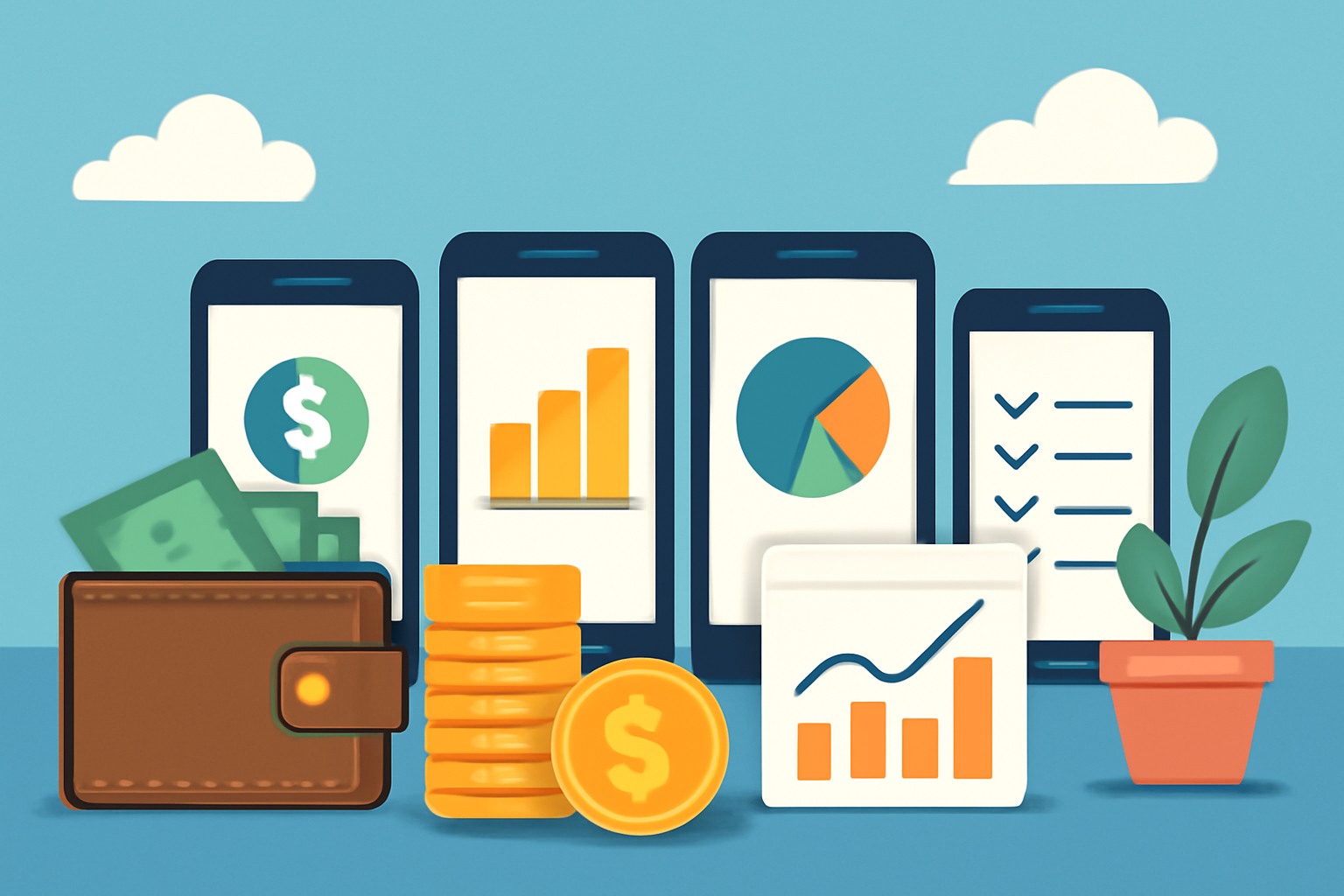Managing your personal finances has never been more important—or more accessible. As inflation, gig work, and digital banking continue to reshape how we earn and spend, an increasing number of people are turning to technology for help. Financial organization apps are rapidly evolving to meet modern needs, helping users track expenses, automate savings, plan budgets, and gain real-time insights into their financial health. In 2025, the best apps for organizing your personal finances aren’t just digital notebooks—they’re comprehensive money management systems that use AI, automation, and real-time integrations to make financial clarity easier to achieve.
This article explores the current hot trends in financial organization tools and highlights the top-performing apps worth considering right now.

Why Digital Finance Tools Are Booming
The surge in financial apps is driven by several major trends:
- Decentralization of Income: With freelancing, gig work, and remote employment becoming mainstream, people need better tools to track multiple income sources and irregular pay cycles.
- Rising Financial Anxiety: According to a 2024 study by the National Endowment for Financial Education, 7 in 10 adults report feeling stressed about money. Financial apps are increasingly being used to ease that pressure through real-time visibility and automated planning.
- AI and Open Banking Integrations: Apps are getting smarter. Tools like Plaid and Yodlee allow secure bank data integration, while AI features offer insights into spending habits, saving opportunities, and cash flow forecasting.
The Best Apps for Organizing Your Personal Finances in 2025
Here’s a curated list of top-rated apps, their core strengths, and what makes them stand out in today’s financial landscape.
1. Monarch Money
Best for: All-in-one financial management
Monarch Money has become a leader in personal finance for those seeking detailed control without complexity. It offers budget tracking, customizable categories, net worth tracking, and collaborative planning—ideal for couples or families managing finances together.
Key Features:
- Connects to all major financial institutions
- Forecasting tools for future planning
- Easy interface for multi-user collaboration
Monarch’s ability to display your complete financial picture—bank accounts, investments, and even crypto wallets—makes it a strong contender in 2025’s app market.
2. YNAB (You Need a Budget)
Best for: Budget-focused users who want full control
YNAB continues to evolve and remains one of the most respected names in the space. While it does come with a learning curve and a subscription fee, its “zero-based budgeting” model has helped thousands of users understand every dollar they earn.
Key Features:
- Category-based budgeting that promotes conscious spending
- Real-time syncing across devices
- Goal tracking with monthly adjustments
The YNAB community is a unique value-add, with thousands of users exchanging ideas and budget templates.
3. Copilot
Best for: Visual learners and spending insight seekers
Copilot is gaining traction for its clean, intuitive design and machine learning features. It automatically categorizes transactions, detects unusual spending patterns, and sends alerts based on behavior.
Key Features:
- Uses AI to identify habits and suggest adjustments
- Excellent for those who prefer charts and visuals
- iOS-first design with Apple integration
It’s especially helpful for users overwhelmed by spreadsheets, offering simplicity without sacrificing depth.
4. PocketGuard
Best for: Expense control and identifying saving opportunities
PocketGuard helps you understand how much you can safely spend after bills, subscriptions, and goals are accounted for. It’s ideal for people who want clarity without diving too deep into the details.
Key Features:
- “In My Pocket” feature shows spendable cash
- Tracks recurring expenses and subscriptions
- Personalized tips to reduce spending
In 2025, this app has expanded its functionality to include shared budgeting with family members or roommates.
5. Spendee
Best for: Multi-currency and household budgeting
Spendee continues to be a favorite among international users and digital nomads. With support for multiple currencies and joint wallets, it’s ideal for couples or roommates managing shared expenses.
Key Features:
- Visual dashboards for spending habits
- Manual or automatic bank connection options
- Group wallets for travel, events, or families
Spendee’s flexible setup makes it accessible for both casual and advanced users.
Emerging Features to Watch in 2025
The best apps for organizing your personal finances now include features that go far beyond traditional spreadsheets:
- AI-Powered Forecasting: Tools like Monarch and Copilot now predict cash flow weeks in advance.
- Financial Wellness Scores: Apps are using algorithms to assign wellness scores and track improvement over time.
- Real-Time Alerts: Instead of just monthly summaries, apps now send immediate notifications about overdrafts, unusual charges, or unexpected deposits.
- Behavioral Nudges: Subtle reminders, like notifications encouraging users to hold off on impulse purchases, are helping reinforce good habits.
These features are transforming passive tracking tools into active financial coaches—subtly guiding users toward better decisions.
How to Choose the Right App for You
Every financial situation is unique, so choosing the right app means evaluating a few key questions:
- Do you want active control (like YNAB) or passive oversight (like Copilot)?
- Is your income steady or variable?
- Are you budgeting alone, or with a partner or household?
- Do you prefer automation or manual input?
- Are privacy and security a top concern?
Answering these questions can help you identify the app that matches your lifestyle and financial behavior. Most platforms offer a free trial, so testing two or three before committing is a smart strategy.
Key Tips for Getting the Most from Financial Apps
Once you choose an app, here are a few tips to maximize its value:
- Link all accounts: Include checking, savings, credit cards, and investments for a full picture.
- Set realistic budgets: Don’t aim for perfection; aim for progress.
- Review weekly: Build a habit of checking your dashboard regularly—small check-ins go a long way.
- Adjust categories as needed: Life changes, and so should your financial priorities.
- Use the insights: Pay attention to automated suggestions, they’re often based on patterns you might miss.
Final Thoughts
In 2025, the best apps for organizing your personal finances aren’t just about budgets—they’re about behavior, awareness, and strategy. These tools empower users to take control of their money through automation, clarity, and data-backed insights. Whether you’re just getting started with budgeting or looking to refine a complex financial plan, there’s a digital solution that can meet you where you are.
The right app can become more than just a tool—it can be the foundation for lasting financial stability.
Focus Keyphrase: Best Apps for Organizing Your Personal Finances
Meta Title:
Best Apps for Organizing Your Personal Finances in 2025
Meta Description:
Discover the best apps for organizing your personal finances in 2025. Compare top tools for budgeting, saving, and tracking money with real-time insights.
Slug:
best-apps-organizing-personal-finances-2025
References:
- National Endowment for Financial Education (2024). Financial Stress in the U.S.: A Rising Challenge. https://www.nefe.org
- Money.com (2024). The Top Budgeting Apps for 2024 and What Makes Them Work. https://money.com/budgeting-apps-2024
- Forbes Advisor (2025). Best Budget Apps Of May 2025. https://www.forbes.com/advisor/banking/best-budget-apps
- NerdWallet (2025). Best Personal Finance Apps to Keep You on Track. https://www.nerdwallet.com
- Business Insider (2025). AI and the Future of Personal Finance. https://www.businessinsider.com









